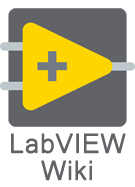LabVIEW Learning Materials: Difference between revisions
New page: ==Learning LabVIEW == There are a lot of useful resources in your LabVIEW package: online help, the online reference manuals, and the LabVIEW code examples. You can find a also find plenty... |
No edit summary |
||
| Line 18: | Line 18: | ||
*http://www.upscale.utoronto.ca/GeneralInterest/LabView.html | *http://www.upscale.utoronto.ca/GeneralInterest/LabView.html | ||
*http://attila.sdsu.edu/me205/modules/labview.html | *http://attila.sdsu.edu/me205/modules/labview.html | ||
[[category:LabVIEW fundamentals]] | |||
Revision as of 09:39, 8 October 2007
Learning LabVIEW
There are a lot of useful resources in your LabVIEW package: online help, the online reference manuals, and the LabVIEW code examples. You can find a also find plenty of articles, ready made applications and technical notes on the National Instruments Web site and in the NI Developer Zone at http://zone.ni.com
However the most efficient and quick way to understand LabVIEW is to take the courses offered by National Instruments. The recommended units for those with no knowledge of LabVIEW are Basics I and Basics II. These courses will allow you to start building your code even if you have never programmed a computer before. New additions to the National Instruments training resources also include Intermediate I and II, which introduce LabView programmers to topics that will help them develop more complex real-world applications. If you aren't in a location that is close to a NI training site, you can also get self paced training from National Instruments.
You could argue: why should I spend more to get this training? The answer relates to how much is your development time and the cost of making simple errors? LabVIEW as a graphical programming language is quite different from text based programming and there are many traps for the novice.
If your preference is not to spend this amount of money, you can spend less for any number of very good books about LabVIEW. The list of books which most of the LabVIEW gurus recommend or have written themselves can be found at:
http://www.ni.com/reference/books/labview.htm
If you like to pay nothing at all, spend some of your cheap time with free "training" at a local NI branch "LabVIEW Hands On" day. Then read the "G Programmer's reference manual" and the LabVIEW "User Manual" found in your LabVIEW documentation.
